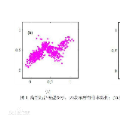The Gaussian mixture model (GMM) provides a simple yet principled framework for clustering, with properties suitable for statistical inference. In this paper, we propose a new model-based clustering algorithm, called EGMM (evidential GMM), in the theoretical framework of belief functions to better characterize cluster-membership uncertainty. With a mass function representing the cluster membership of each object, the evidential Gaussian mixture distribution composed of the components over the powerset of the desired clusters is proposed to model the entire dataset. The parameters in EGMM are estimated by a specially designed Expectation-Maximization (EM) algorithm. A validity index allowing automatic determination of the proper number of clusters is also provided. The proposed EGMM is as simple as the classical GMM, but can generate a more informative evidential partition for the considered dataset. The synthetic and real dataset experiments show that the proposed EGMM performs better than other representative clustering algorithms. Besides, its superiority is also demonstrated by an application to multi-modal brain image segmentation.
翻译:高斯混合模型(GMM)为集群提供了一个简单而有原则的框架,其属性适合统计推断。在本文中,我们建议在信仰功能的理论框架内提出一个新的基于模型的群集算法,称为EMM(明显的GMM),以更好地确定群集成员不确定性的特征。有了代表每个物体组群组成的质量功能,提议了由各组群各组成部分组成的表面高斯混合分布模式,以模拟整个数据集。EGMM的参数是用专门设计的预期-最大化算法估计的。还提供了允许自动确定适当组群数量的有效指数。拟议的EMMMM与经典的GM一样简单,但可以为考虑的数据集产生更丰富的证据分布。合成和真实的数据集实验表明,拟议的EGMMM比其他具有代表性的群集算法表现得更好。此外,其优越性还表现在多模式的大脑图像分割应用中。



